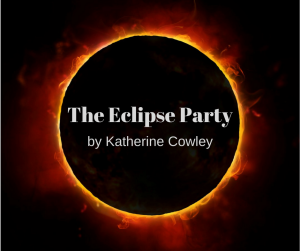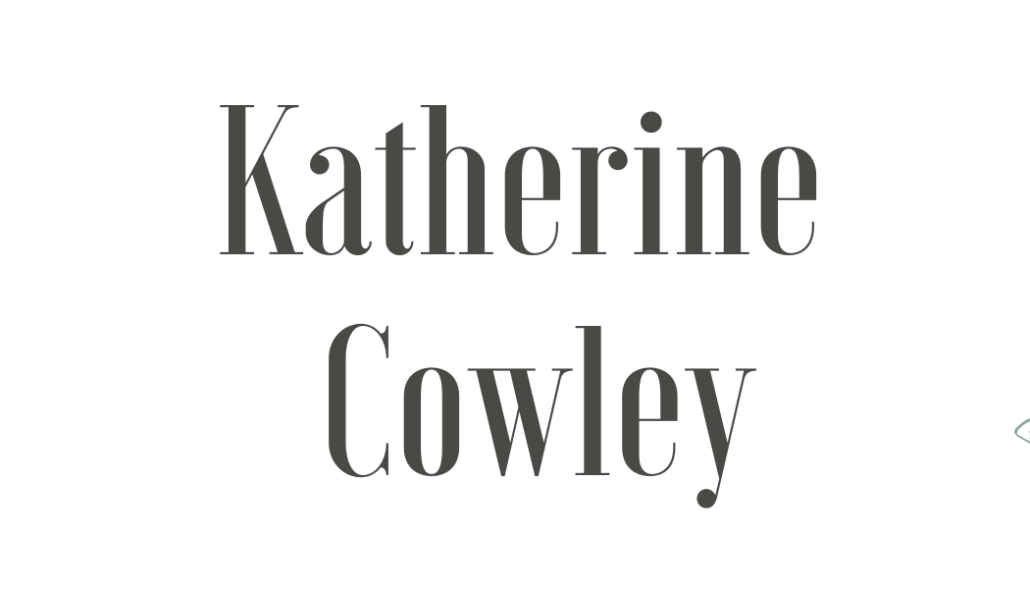The Eclipse Party: A Short Story by Katherine Cowley
In honor of today’s solar eclipse, I gave myself the writing challenge of creating a story about the eclipse in one weekend. The result is a short story about a woman whose granddaughters force her to attend a rather unusual eclipse party.

The Eclipse Party
Except for a poky rim around the edge that Marisel’s granddaughters insisted represented the sun’s corona, the cookie had been painted black and practically dipped in black sprinkles. Marisel disliked sprinkles of any type and never used black frosting (it was hard to convince your mind that black food was not mold) but she forced the cookie into her mouth and swallowed.
Sophie gave her an approving smile. The nine-year-old had done most of the planning for this party, and for the last thirty minutes had ushered Marisel from one bizarre activity to the next.
Lu, age seven, twirled in a circle, unable to stand still. “Did you know,” she said, half a cookie shoved in her mouth, “that an eclipse is something eating the sun?” Black sprinkles stuck to her chin. “Did you know that there is a demon named Rahu, and Vishnu cut off his head, and sometimes he eats the sun, but since his head was cut off, when he swallows the sun it falls out the bottom of his head?”
“I…did not know that,” managed Marisel.
“It’s actually just a legend,” said Sophie authoritatively. “What’s really happening is the moon is passing in front of the sun.”
Lu grabbed Marisel’s hand with her sticky fingers and they checked the pinhole projector again. “Not yet!” Lu declared. “Remember, grandma, don’t look at the sun until it’s completely covered.”
Sophie approached with a shoe box that had been scribbled black with a permanent marker. “This is the most important thing you’ll do today,” she said dramatically. “Take a piece of paper and a pen. You need to write down something that’s been bothering you. It should be something that’s hard for you. When you finish, you’re going to put it in the box, and when the eclipse happens you are going to let it go.”
Both her granddaughters quickly wrote something on their slips, but Marisel twirled her pen in her fingers. Her husband, Daniel, would’ve come up with something clever, she thought wistfully. And maybe she would’ve too, once. After a few minutes she managed to write, “Getting stressed when I lose the matches to socks.”
Lu and Sophie dragged her to the next activity, which was properly positioning their homemade black sugar crystals—why did they have to choose black?—so they could capture the positive energy from the sun’s return. Then they carefully poured water into a mason jar. Once again, it was supposed to capture positive energy, so then little sips could be drunk later, on days when you most needed it.
“Now you need to stir this water seventy times,” said Sophie, handing her a wooden popsicle stick. “Clockwise. We’ll be right back.”
Marisel stirred but didn’t bother to count. She sighed and shot a glance at her daughter-in-law. She was the type to let her kids indulge in this sort of mystical nonsense. Marisel would’ve said something to her about it, but there was a chance her granddaughters would hear, and she didn’t want to spoil their party for them. She would have to talk to her daughter-in-law about it later.
She had just finished stirring the water what must be about seventy times when her granddaughters returned with the black shoe box. They both looked upset, though she couldn’t tell if it was at each other or at her.
“You wrote the wrong thing on your paper, grandma,” said Sophie. “This was serious. It wasn’t supposed to be about socks.”
Marisel had been right. She should’ve tried to come up with something clever.
“I wrote the right answer for you,” said Lu, holding up the paper.
Sophie tried to grab it from her younger sister. “But it might not work now,” she said. “Grandma has to want to let it go, or it won’t work.”
They bickered, fighting over the paper, until Marisel reached out her hand and said, “Give it to me, girls.”
Heads bowed, they handed her the paper.
Marisel unfolded it. Lu had crossed out her statement about socks, and, in the handwriting of a seven-year-old, written, “stop being sad about Granpa Daniel.”
Marisel swallowed and blinked away the moisture in her eyes. They were wrong—she did not need to let her sorrow go. Yes, it had been two years, and she’d accepted her husband’s death, but the loss was a constant part of her, as it should be.
“You’re not as fun as you used to be,” said Lu.
“That’s not nice,” said Sophie, shooting a dirty look at her sister. “Mom says that you won’t let yourself move on and enjoy things, and that it’s hurting you. And Dad says it will just take more time. But I don’t want it to take more time. I want you to be you again.”
“We miss grandpa too,” said Lu.
Marisel stood there, numb, unsure of what to say, or how to process their accusations. What did they mean she wasn’t herself anymore? She always took days off to do fun things with them, attend their performances and field trips. She looked at her watch. Maybe, today, she should’ve stayed at work. She was running low on vacation days, and she had a project due tomorrow that she’d have to stay up late tonight finishing.
“It’s almost time, girls,” her daughter-in-law called.
Lu grabbed the paper out of Marisel’s hand and shoved it in the black box. Both girls scampered over to the pinhole projector.
Marisel stood there, slid her wedding ring in a circle around her finger, vaguely aware of her granddaughters exclaiming as the moon covered more and more of the sun. She’d tried to move forward, she really had. She’d even met once with a therapist who specialized in grief. But it was too much sometimes to act like everything was okay, too hard to keep pretending.
Suddenly her granddaughters were screaming. It was dark and the air around her was cold, as if a vacuum had sucked all the warmth and light out of the sky.
Lu danced up to her and pointed her hand. “Mom says you can look at the sun now!”
And so Marisel looked, tilting her head upward and for the first time in her life staring straight at the sun.
The sun was black—blacker than the cookies, an unnatural blackness, an absence, a dark beast with light tendrils reaching out from its edges, trying to consume her.
The moon had blotted out the sun, blotted it out completely. And yes, you could see some stars, but she did not want to see the stars—it was supposed to be day. Daniel had died too young, it had not been expected, they still had so many plans for things they wanted to do, trips they wanted to take, experiences they should’ve had, if they had been robbed from her like the light from the sky.
Marisel wanted to look away from what was missing in the sky, but she could not. The eclipse would swallow her whole, and for a moment she believed the legends, believed that it could be a bad omen. It was unreal, impossible to comprehend, just as she still could not comprehend her own loss, still could not move forward.
Sophie pushed a pan and a wooden spoon into her hands. “We have to scare the moon away! We have to bring the sun back, or it’ll stay dark forever!”
Sophie and Lu and even her daughter-in-law started banging their pans as loud as they could, yelling, “Release the sun!”
Marisel banged the pan half-heartedly at first, but then started hitting it with all her might. “Release the sun! Release the sun! Release the sun!” she shouted with them, tears running down her face.
And then, in an instant, the sky lightened.
“Everyone look at the ground,” her daughter-in-law directed. “Right now, so you don’t go blind.”
Marisel forced her eyes away from the sky, to the ground. There was no need to look up anyways, not anymore, for the light had come back like a flash, as if it had never been dark in the middle of the day, as if the eclipse were a distant memory and not something she’d just experienced.
“Did it work? Did it work?” Lu shouted, holding up the black shoe box.
Marisel didn’t know if she’d really let go, or if she ever could completely, but something in her had released, had fled as the sun had returned. There had been darkness, there had been cold, but now there was light and warmth and maybe a bit more possibility.
She set down her pan and her wooden spoon and smiled at her granddaughters. And for the first time in a long time, there was nothing forced about the upward curve of her lips. She pulled them into a hug and held them until they squirmed.
“I think it worked,” she said. “Now can I try one of your sugar crystals? Or are we supposed to wait until later?”
“We can eat them now!” the girls declared and ran to get them.
Marisel sucked on her black sugar crystal. To her surprise, despite the color, it tasted good. Maybe the sun really had given it some positive energy.

Leave a Reply
Want to join the discussion?Feel free to contribute!